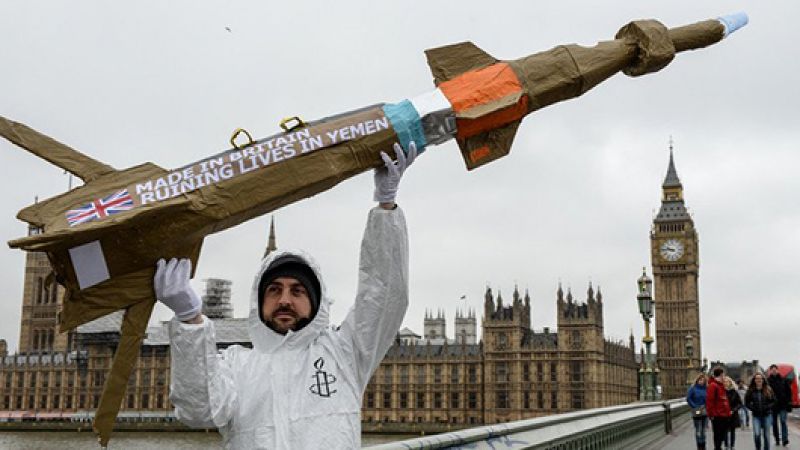
By Tom Peck
Campaign groups and representatives of the UK’s leading political parties have renewed a call for an end to the sales of British arms to Saudi Arabia, in the wake of ongoing human rights abuses and damning evidence on the use of banned British-made cluster bombs.
Since evidence was revealed in mid-December, that now-banned British-manufactured cluster bombs sold to Saudi Arabia decades ago have almost certainly been used in the conflict, MPs from the UK’s three leading political parties and other campaign groups, are asking again for a ban on sales of British arms to the Saudi regime that is leading an intervention of nine middle eastern countries in the Yemeni civil war.
Since Saudi Arabia began bombing Yemen in March 2015, the UK has licensed £3.3bn worth of arms to the regime, including aircraft and drones, grenades and missiles, vehicles and armored tanks. The UN estimates more than 4,000 civilians have been killed by Saudi air strikes in the conflict.
Saudi Arabia says it is investigating claims that human rights abuses have been committed.
The shadow Foreign Secretary Emily Thornberry said: “The Government says they will back an independent inquiry into alleged violations of international humanitarian law – but we must wait until the Saudis have given their own verdict. Weddings are bombed and we wait, vital agricultural infrastructure is bombed and we wait, British cluster bombs are used and we wait, millions stand on the brink of famine and we wait. The waiting needs to stop. We must suspend arms sales to Saudi Arabia until there is a ceasefire in Yemen and all alleged violations of international humanitarian law have been fully and independently investigated.”
MP Chris White, who is chair of the parliamentary committee on arms sales, told The Independent: “We have been playing catch up on this issue, reviewing events that have led to civilian casualties after they occur. The loss of life and deep humanitarian crisis in Yemen require an unequivocal response from the international community. Our diplomatic relations with Saudi Arabia are important, but I maintain the view of the joint report of the Business, Innovation and Skills and International Development select committees that arms sales to Saudi Arabia should be suspended, pending the results of a UN-led investigation.”
British arms manufacturers have signed at least £5.6bn worth of contracts with the Saudi Arabian government since the 2010 election. The conservative Muslim nation has long been a key strategic ally of the UK in the Middle East, with arms contracts totaling tens of billions over the last three decades. In 2007, the then acting Liberal Democrat leader, Vince Cable, refused to attend a state dinner at Buckingham Palace for the previous Saudi King, King Abdullah.
The Liberal Democrat Foreign Affairs spokesperson Tom Brake said: “The UK Government has defended Saudi’s violent targeting of civilians in Yemen time and time again, even giving incorrect information to Parliament in defence of the brutal regime for a six-month period.
“British foreign policy must be open and tolerant. It should show its commitment to international humanitarian law by immediately suspending all arms contracts with Saudi Arabia.”
The Government conducted an internal review into its sale of arms to Saudi Arabia last year, which concluded with Foreign Secretary Boris Johnson, International Trade Secretary Liam Fox, International Development Secretary Priti Patel and Defence Secretary Sir Michael Fallon issuing a joint statement vowing to continue granting licences for arms exports to the Middle Eastern country.
But since then Mr Johnson has publicly accused Saudi Arabia of acting as a “puppeteer” in “proxy wars” in the Middle East. Labor’s Yemeni born MP Keith Vaz said that the comments, given the UK’s close links with Saudi Arabia, undermined Britain’s global reputation.
It also emerged in December that the Sir Michael has seen Government analysis which indicates that the banned UK-made cluster bombs have been used by the Saudis, in the conflict in which Britain is training Saudi forces.
This week, the High Court will hear a judicial review over the legality of UK arms exports to Saudi Arabia for use in Yemen, following an application made by pressure group the Campaign Against Arms Trade. Amnesty International, Human Rights Watch, Rights Watch (UK) and Oxfam will make submissions to the Court.
“The UK government’s repeated refusal to halt arms transfers beggars belief, given the extensive and credible reporting showing the Saudi Arabia-led coalition’s ongoing serious violations of international human rights and humanitarian law, including possible war crimes,” said James Lynch, head of arms control and human rights at Amnesty International.
“It is a sad state of affairs that NGOs have to go to court in an effort to force the UK government to do the right thing for the people of Yemen,” he said. “How many civilians need to be killed, maimed, rendered homeless, and have their hopes and dreams shattered by Saudi Arabia-led forces that the UK government, among others, continues to recklessly arm?”
Andrew Smith, a spokesman for Campaign Against Arms Trade, described the UK’s provision of arms to Saudi Arabia as a “slap in the face” for the victims of the Saudi-led attacks on Yemen.
“The UK public is rightly appalled by arms exports to abusive dictatorships like the one in Saudi Arabia. The Saudi regime has a dire human rights record at home and has used UK arms to create a humanitarian catastrophe in Yemen,” said Mr. Smith.
“For decades now, the UK has given uncritical political and military support to the Saudi Royal family. The message it sends is an endorsement of the repression taking place, and a slap in the face for those they are brutalizing at home and bombing in Yemen.”
Source: The Independent, Edited by Website Team